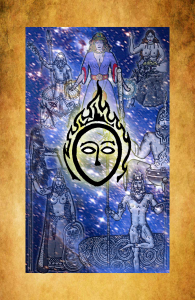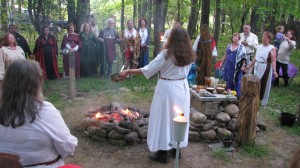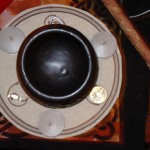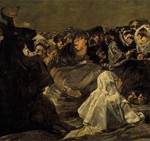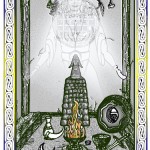To Worship the Gods
In our new religious movement (which I’ll continue to call Paganism, in general, despite the difficulties in that term) We often find ourselves reacting to and with religious ideas from our mainstream culture. One of the most contentious of those ideas is that of worship itself, and the development of a non-unitary idea of what a god might be.
What’s a God?
I keep finding myself talking with folks who are making deals with powerful spirits, entering long-term relationships with them, etc, but who assert that they do not “worship gods”. It’s a thorny conceptual maze, those terms, but one that is central to how we understand what it is we are doing, and what the ancients and modern tribal peoples do. So I’ll take a whack at trying to find the out-door.
I do think we must discard the entire corpus of post-pagan theology and religious philosophy if we are to understand tribal and polytheist thought. I begin by asserting that in a Euro-Pagan context, at least, there is no such thing as a Creator and Lord of the Universe. No god is that. I don’t believe that absolute omnipotence or omniscience are available to any specific being, and so I do not attribute those to gods. Relative omnipotence is another matter.
I don’t think that the All-Being of the cosmos is a person, or accepts worship, or gives a crap about what happens to existence – it just *is*. Mystics may have a use for it, but it’s pretty pointless for common magic and religion. In the same way I do not believe there is any plan in or for the cosmos, unless several powerful beings get together and make one for a while. The All does not exercise Providential Will. Individual gods exercise individual will.
The Germanic root of the term ‘god’ means “that to which we sacrifice”. Out of the great cosmos of spirits, many are indifferent to mortals, but some choose to respond to our invocations. Out of those, some are especially effective in granting us their blessings. These beings become the gods of various peoples. Poets write pretty stories about them, turn them into a big Royal Family, etc, but they are still a subset of spirits.
So when I use the term god, generally, I mean ‘a spirit who answers offering with blessing’. Incidentally, I find that the term god is entirely inappropriate to refer to the Ultimate Reality, or to the Ground of Being. Once again, those are impersonal realities that do not love or hate, have will or intention. I sometimes use the general term ‘the divine’, but I mean it in the way one uses ‘nature’ to refer to general trends in the material world.
So, let’s forget about all that, and try to begin from first principles.
1: There are spirits. Leaving aside just what spirits “really” are, it is obvious that humans in every age and culture have experienced contacts with spirits. The development of relationships with those spirits is what amounts to “religion”.
2: The development of relationships with the spirits brings blessing. The reason our species bothered is that we perceived positive results from our efforts with the spirits.
3: Over the eons we developed relationships with specific spirits, often seeking great powers that transcended immediate locale (Sun, moon, wind, etc) but also meeting local spirits of stone and stream. Renowned ancestors may also become regular parts of a local religion. “Religion” then, means re-linking. It is the regular maintenance of the links between mortals and the spirits.
4: In a broad sense, in English, any of the spirits who are offered to and respond to offerings are ‘gods’. They are also ‘spirits’. Cultures differ about whether there’s a big distinction between those categories.
For this to make sense we must entirely abandon the notion that ‘god’ refers to some unique category, different in kind from the rest of existence. Gods are not apart from nature, or from spirit, or from biological life including humankind. Gods are specific beings within the broader category of spirits. They may be big, cosmic-y gods, or immediate local gods. Ancient Pagans had no problem referring to the gods of the hearth or the well, referring to spirits much lesser in cosmic-story significance than the Olympians. Any spirit with whom one enters a relationship of offering-and-response can reasonably be referred to as a god, though it is often useful to define additional subcategories. In Greek the word theos is applied both to spirits who receive worship and to human kings and rulers. In that usage a ‘god’ is not limited even to spirit beings, but is any being that has the power to give blessing in return for honor.
To be complete it is worthwhile to examine the mythic model that also answers my original question. In this I must limit myself to Indo-European examples, both for brevity and because that’s as far as my slim expertise extends.
In Euro-Pagan story, an original chaos comes to be divided (mysteriously) into polar opposites. These usually non-personal opposites then generate the basis of existence-in-form. From that basis, by various premises, the first personal beings arise, occupying the closest we see to a ‘prime mover’ in old models. These primal beings are ‘gods’ mainly in the sense that they are ancient and renowned – they seldom receive worship in the actual cult of the people. Perhaps one or more of these primal beings finds a place in the final pantheon. Often a later god-name becomes associated with a primal figure of tribal stories.
From these usually dim and symbolic origins arise tales of a first family of deities. Usually confused, miraculous and incestuous, the great ones play and war among themselves. Usually a primal war occurs, between the gods who later become the gods of mortals, and other powers less friendly to human comfort. The gods who like mortals defeat the gods who don’t care, and the bits or order that allow life are carved out. Our world is one such orderly enclosure, held fast by our gods and spirits.
My above abstract model might seem to lack in reverence. The mythic model includes it fully. The gods, in this case, are the eldest and mightiest, wise and caring, who maintain the turning of seasons and support the continuation and prosperity of the tribe. They are worthy of worship by their very natures, the way an accomplished hero is worthy.
In practice the mythic model is still fairly permeable. That First Family adopt others, have new children, marry and make alliances. Local spirits and ancestors may be promoted, variant pantheons are normative. Most of the basic formula proposed above still applies in fact, whatever the poets say.
So, if I were to answer my own question, in light of all this, I might say:
A god is a being, especially a spirit, who has power and will answer honorable worship with good blessing. While the term can be applied even to small local spirits, it is most often reserved for the oldest, greatest or most central of the spirits honored by a tribe.
What’s Worship?
On the topic of “worshipping gods’ I have covered what I think a god is. Now I’ll take a whack at what I think ‘worship’ is. There is hardly a stickier, pricklier term in all of modern Pagan discourse.
I’ll put my cards on the table. My goal is to demote the word ‘worship’ from its specialized place of honor or disdain in modern times. I want to normalize it, and strip it of its special status.
Let’s start with the schoolboy stuff:
From Wikipedia (because I know it’s accurate):
“Worship is an act of religious devotion usually directed towards a deity. The word is derived from the Old English weorþscipe, meaning worship, honour shown to an object, which has been etymologised as “worthiness or worth-ship”—to give, at its simplest, worth to something.”
wor·ship n.
1. a. The reverent love and devotion accorded a deity, an idol, or a sacred object.
b. The ceremonies, prayers, or other religious forms by which this love is expressed.
2. Ardent devotion; adoration.
3. often Worship Chiefly British Used as a form of address for magistrates, mayors, and certain other dignitaries: Your Worship.
[Middle English worshipe, worthiness, honor, from Old English weorthscipe : weorth, worth; see worth1 + -scipe, -ship.]
1: chiefly British: a person of importance —used as a title for various officials (as magistrates and some mayors)
2: reverence offered a divine being or supernatural power; also : an act of expressing such reverence
3: a form of religious practice with its creed and ritual
Remembering that dictionaries are only commercial efforts to compile usages, I especially note two things. First, in no case is worship said to involve personal abasement, bowing, scraping, etc. Second, I note that worship is not reserved for any specific category of being. It is extended to gods, ‘supernatural beings” (never mind…), and honored humans.
Here we must, once again, discard the weight of historical western religious thinking. The central principle with which so many of us were raised is that only “God” is worthy of worship. In that model worship is a special position of the emotions and intention that elevates “God” above all other things. All other beings can only be approached with some lesser degree of emotion and intent – often described in English as reverence or devotion. The Roman church uses Latin terms:
Latria vs. Dulia and Hyperdulia
“Latria is sacrificial in character, and may be offered only to God. Catholic and Orthodox Christians offer other degrees of reverence to the Blessed Virgin Mary and to the Saints; these non-sacrificial types of reverence are called hyperdulia and dulia, respectively. In English, dulia is also called veneration. Hyperdulia is essentially a heightened degree of dulia provided only to the Blessed Virgin.”
So this is the deeply-written core notion of western religiosity – that worship belongs only to the Highest, the Most True, the Ultimate, etc. I think this is among the most important notions to discard as we attempt to regain an understanding of ancient ways. It is an imposition of monotheism, for the most part.
When approaching a word with thick layers of meaning I like to return to etymological origins. I know this isn’t the end of any story about a term, but I like it for clarification. The term worship does not have, at its base, any reference to the divine or spiritual. Instead it refers to the human act of giving honor or respect to another.
Perhaps we should begin at what may be the strange end for westerners – the worship due to other people.
“the five central religious duties or “sacrifices” of the Hindu householder: paying homage to seers, to Gods and elementals, to ancestors, to living beings and, manushya yajna, “homage to men,” which includes gracious hosting of guests.”
In English we find ‘worship’ applied to magistrates and other ‘worthies’. There is simply no reason to consider worship to be some high and special position of the heart, reserved only for the highest and most-special things. It is proper, in my opinion, to offer worship to anything in life one finds worthy of respect.
In fact, that would be my own definition of worship in a Pagan context:
The ritualized expression of respect and honor.
The ritualization part can feel funny for modern people in our informal age. In more formal times ‘ritualized respect’ included proper forms of address and detailed rules for social interactions. For some periods and in some places this ritualized respect might have included a degree of ‘bowing and scraping’ (when your lord can kill you or make you rich at a whim, there’s this tendency…). More commonly it includes exchange of gifts, mutual obligation and mutual respect between me and the powers that I worship. In some extremely formal situations, such as eastern guru-worship we see the material presence of a teacher treated as the idol of a deity. That’s strange for moderns, but fully within the spirit of the traditional idea of worship. Most notably for us it again illustrates that worship in a polytheistic context is not limited to the highest or ultimate being.
In the same way, worship does not require any sense of hierarchy or superiority/inferiority. Kings pay ritual respect to other kings, farmers to farmers and, yes, gods to gods. I fall back on Hindu tales again, where when one god petitions another for aid they are plainly said to worship and sacrifice to them. Hellenic story is less specific, though we plainly see gods petitioning other gods for aid. In modern Hinduism the pious greeting is the ‘Namaste’ or “Namaskar’, understood to mean “The god in me greets the god in you with worship”.
In this we can understand that no being is omnipotent. No being shapes the world through personal will alone. All beings exist in relationship, depending on the power and good-will of others for our successful lives. All beings must maintain relationship with other beings in order to work our will – even individual gods. Thus it is not abasement or acknowledgement of superiority that drives worship, nor need it be based on overwhelming awe and wonder. Simply the need or desire to establish relationship is all that is involved in the basic idea of worship.
In ADF we sometimes do a style of rite in which we pass the toasting cup, and each present toasts to those spirits that are important to them. Strictly ethnic Pagans might be appalled at some of our rounds, as people toast gods of various cultures, ancestors, nature spirits and, often enough the spirits of living animals, especially their personal companions. While I find a degree of humor in worshipping one’s housepets, I can’t really fault it. It seems proper to respect and honor those you allow to live with you, and thus proper to express that respect in a sacred way. Worship is no more fraught than that.
Next, I find that Pagan worship in no ways requires or assumes exclusivity. There is not the slightest notion from ancient lore that the gods were jealous of one another, or that they ‘competed’ for worshippers. While households, occupations and districts might have their favorite local powers it was understood that people invoked the gods at need, through the customary methods of offering and asking. On the other hand too much is made of ‘categorizing’ the gods (love, war, etc). If a worshipper had a relationship with a powerful spirit that would be the first spirit one asks for aid, even if one is asking a mother goddess for victory in strife. When travelling it was normative, and good manners, to worship the gods of the house or land in which one found oneself. The notion of loyalty to one’s gods did not commonly include exclusivity.
Some religious models suggest that reciprocity is impiety – that we ought to worship because the gods are too wonderful not to worship, and that asking for things in turn is impious. There is great value in generating experiences of awe and wonder in the personal mind. However, I think that from a Pagan perspective we must set aside the notion that worship is primarily a response to awe. Certainly approaching powerful spirits is like approaching a Tesla coil – it produces effects. Those effects are, themselves, desirable, and lead to repeated action. However I don’t think we need some moth-to-the-flame motivation for worship – self-interest is a noble enough cause. We worship because it is good to worship – it produces good for us, and for the spirits with which we interact.
Proceeding from that I would suggest that Pagan or magical worship is not primarily a position of the heart, but a deed of the hands. Worship is accomplished through willed action. Usually this is ritual action – making an offering, reciting a charm in a spirit’s name, etc. It can be a purely internal action – such as a visualization and silent invocation – but it is deliberate, conscious and focused. The spirits may or may not be concerned with the ‘sincerity’ of the action, so long as the proper ritualized respect is shown. My experience is that the more intimate one’s relationship with a god or spirit becomes the more this stuff matters, though even my hearth gods do not seem to require every offering to be made from the very sweetest position of my heart.
These positions – mutual worship, non-exclusivity, the piety of reciprocity, and praxis-preference – are easy to find attested in lore. Forgive me for not tracking down citations for this blog post.
I suppose my goal here is to rinse away some of the recent accretion of nonsense on the fine old idea of worship. It’s no big deal. When you offer a guest a drink on arrival it is worship. When you leave a harvesting-offering for an herb or tree spirit it is worship. When you place your ancestors’ pictures in a place of honor it is worship. From there of course one proceeds to the other traditional elements of worship – singing hymns, giving praise, offering food and drink. What guest would not be pleased by such kindnesses?
This is why I do not hesitate to say that I worship my ancestors, or the land-wights, or the ground I walk on. It’s only right, and no big deal.

